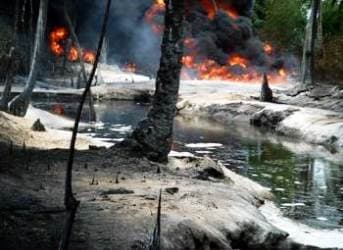A report last week from Amnesty International said energy companies operating in the oil-rich Niger Delta region weren't entirely up front about what's causing the "hundreds" of spills reported every year in the region. In a 66-page report, the rights group said oil companies, in particular Royal Dutch Shell, have made numerous claims about sabotage and oil theft that raise a series of questions. Now, lawmakers in OPEC member Nigeria are mulling legislation that would tighten penalties for oil companies responsible for the spills. The cost, if passed, would be in the millions of dollars for the companies operating there.
Amnesty, in its report, said the hundreds of oil spills reported in Nigeria every year are ruining the environment and putting human lives at risk. It said spills in the Niger Delta are the result of pipeline corrosion, maintenance issues, equipment failure, sabotage and theft.
Related article: Eni Adjusts Profits Amid Africa Chaos
"For the last decade oil companies in Nigeria, in particular Shell, have defended the scale of pollution by claiming that the vast majority of oil spills are caused by sabotage and theft of oil," the report said. "There is no legitimate basis for this claim."
Even if Shell is right, Amnesty's report said, it hasn't done much to ensure its infrastructure in the Niger Delta is protected from vandals. But the problem extends beyond just Shell, the organization said. A Nigerian subsidiary of Italian energy company Eni reported 471 spills in the Niger Delta, compared with the 138 from Shell from January to September. Eni's subsidiary also blames saboteurs, but Amnesty said there's "absolutely no information" to support their claims.
Problems in Nigeria have cost Shell about 65,000 barrels per day in production. Shell in mid-October lifted force majeure on exports of Nigerian crude oil after repairs were made to a pipeline in the Niger Delta region. Shell said about 2,200 barrels spilled from the Trans Niger Pipeline in October, a spill partially blamed on a hole in the pipeline "drilled by unknown persons." The situation wasn't much better for ENI, which last month cut its production outlook in part because of problems in Nigeria.
Related article: China Hopes to Dominate Africa by Boosting Trade Via Indian Ocean
Abuja is mulling new enforcement measures for oil spills in the country. The law, if passed, would slap operators with a $1,300 per barrel fine for spills. Amnesty said Eni's subsidiary, Aqip, was responsible for 4,014 barrels of oil spilled between January and September. For Shell, it was 16,000 barrels during the same period. The penalties under new laws considered by Nigerian legislators would be $7.2 million.
Amnesty said there were "systemic flaws" in the way in which oil spills were investigated in Nigeria. The organization said it took serious issues with what oil companies like Shell said about their operations in one of Africa's top producers. Regulations, it said, are futile, and "there is no meaningful check on the oil companies’ operations" in Nigeria.
ADVERTISEMENT
By. Daniel J. Graeber of Oilprice.com



















If its theft then step up the security of them.